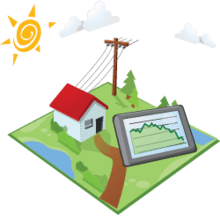Google PowerMeter
Google PowerMeter was a software project of Google's philanthropic arm, Google.org, to help consumers track their home electricity usage.[1] The development of the software was part of an effort by Google to invest in renewable energy, electricity grid upgrades, and other measures that would reduce greenhouse gas emissions. It was launched on October 5, 2009 and ended on September 16, 2011.[2]

The software was designed to record the user's electricity usage in near real-time. According to the company, if half of America's homes' energy use was cut by ten percent, it would equal the average energy used by eight million cars.[3]
It was hoped that this tool would raise the home-owner's awareness of how much energy they use and make users more energy efficient.[1] PowerMeter was intended for use with smart meters able to track electricity usage in more detail than standard electric meters. According to Google, in 2009 there were approximately 40 million smart meters in use worldwide.[1] By early 2009, approximately 7% of US homes had a smart meter installed.
Some other types of electricity meters and in-home energy use displays could also be used with PowerMeter.
Partnerships
In May 2009, Google announced that it had partners with smart meter maker Itron.[4] In October 2009 Google PowerMeter announced their first "device partner", The Energy Detective (TED 5000), an energy monitor from Energy Inc then only available only in North America,[5] and their first UK partnership which was with AlertMe.[6][7] Also in 2009, Yello Strom customers in Germany were able to begin adding the PowerMeter widget to their iGoogle pages to track their energy usage.[8]
In 2010 UK company Current Cost announced a collaboration with Google PowerMeter.[9] San Diego Gas and Electric's Sempra Energy company announced plans to install 1.4 million smart meters in San Diego County and Southern Orange County by the end of 2011[10] and said that after they sent out 100,000 post cards to let consumers know they could use the Google PowerMeter service, about 6% had started to use it.[11]
In June 2011 Google announced the service would cease.[12]
See also
References
- Verne Kopytoff; Ryan Kim (2009-02-22). "Google plans meter to detail home energy use". San Francisco Chronicle. Retrieved 2009-02-11.
- "Google PowerMeter - Save Energy. Save Money. Make a Difference". Google.com. 2011-09-16. Archived from the original on September 2, 2011. Retrieved 2013-06-16.
- "Google Power Meter Analyzes Home Energy Consumption". PCWorld. 2009-02-12. Retrieved 2019-09-05.
- John, Jeff St (2009-05-20). "Google Names Itron, Utilities as PowerMeter Partners". www.greentechmedia.com. Retrieved 2019-09-05.
- Google PowerMeter's first device partner
- Google PowerMeter announce first UK partnership with AlertMe
- UK launch for Google PowerMeter via AlertMe
- "Google PowerMeter comes online in Germany". VentureBeat. 2009-10-10. Retrieved 2019-09-05.
- "High Tech Google and Current Cost Collaboration Gives Brits Total Remote Electricity Control" (PDF). 24 May 2010.
- "Monitor Your Home Electricity Use With Google PowerMeter". SDGE. 2010. Archived from the original on December 11, 2010. Retrieved December 10, 2010.
- "Sempra Energy: Consumers are slowly embracing Google PowerMeter PowerMeter". GreenBeat. November 3, 2010. Retrieved December 10, 2010.
- "An update on Google Health and Google PowerMeter". Google. June 24, 2011. Retrieved January 11, 2016.